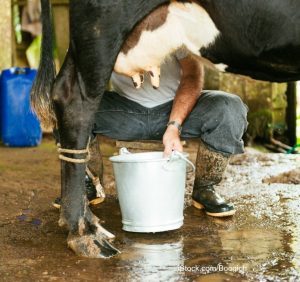A new study evaluating the risks and purported benefits of raw milk finds ample risk but no health benefit to drinking unpasteurized dairy. The study, which appears in the current issue of Nutrition Today, was authored by John A. Lucey, PhD, a professor of food science at the University of Wisconsin–Madison and director of the Wisconsin Center for Dairy Research, College of Agriculture and Life Sciences, University of Wisconsin-Madison.
 Lucey, who researches the chemistry of dairy products and the properties of food proteins, has published more than 100 peer-reviewed articles and more than 21 book chapters. In this study, he critically evaluates the purported benefits of drinking raw milk and finds that they “have no scientific basis and are myths.”
Lucey, who researches the chemistry of dairy products and the properties of food proteins, has published more than 100 peer-reviewed articles and more than 21 book chapters. In this study, he critically evaluates the purported benefits of drinking raw milk and finds that they “have no scientific basis and are myths.”
Myth 1- Pasteurization decreases the nutritional quality of milk.
Not true. According to the study, pasteurization makes no significant change in the nutritional quality of milk; change in protein quality or concentrations of minerals; the concentration of riboflavin (B2) or fat-soluble vitamins like vitamin A or E. And pasteurization results in only minor losses, less than 10 percent, of vitamin C, folate (vitamin B9), vitamin B12, vitamin B6, and thiamine (vitamin B1).
Ultra-pasteurization, the use of extreme heat over a short time, does have a minor impact on the nutritional quality of milk, but other factors have a much bigger effect. Pasture grazing, feed, packaging material of the milk container, light exposure, storage time and storage temperature can all affect vitamin content, Lucey states.
Myth 2 Raw milk cures milk allergies
Not true. Children with cow’s milk allergies can tolerate neither raw nor pasteurized milk because both contain the protein in cow’s milk which triggers the allergy.
Myth 3 Raw milk cures lactose intolerance
Not true. “A recent randomized controlled study found that raw milk failed to reduce lactose malabsorption or lactose intolerance symptoms compared with pasteurized milk among adults positive for lactose malabsorption. Because there is no β-galactosidase enzyme present in raw milk, there is no obvious reason why raw milk could assist with lactose intolerance. Yogurts, which contain high levels of bacteria that have this β-galactosidase enzyme, are tolerated better by individuals with lactose intolerance.
Although raw milk contains low levels of some proteases and lipases, no physiological role in human digestion has been demonstrated for these enzymes.”
Myth 4 Raw milk is a good source of beneficial bacteria
Not true. “Some lactic acid bacteria are considered probiotics. However, key probiotic bacteria like Bifidobacteria or Lactobacillus acidophilus should be present only at quite low levels in raw bovine milk, as they do not compete well with the more common types of lactic acid bacteria. Instead Bifidobacteria are found at high numbers in the gastrointestinal tract of cows and humans, and the presence of Bifidobacteria in raw milk has been used as possible indicator of fecal contamination.When probiotic cultures are used in commercial products like yogurt, it is considered highly desirable that (a) the specific probiotic strain used was originally isolated from a human source (not from animals like cows), and (b) the specific strain conveys proven health benefits when used at high levels (ie, millions of colony forming units per milliliter). None of these conditions are met with any fecal contamination of raw milk by probiotic bacteria.”
And speaking of fecal contamination, some studies show that one third of all raw milk samples contain at least one pathogen such as Campylobacter or E. coli, Lucey points out. There are at least four ways this can happen: the cow has a systemic infection, the cow has udder infection, fecal contamination from the cow or barn during or after milking and fecal contamination from the farmer’s hands.
“Pathogens are not visible to the naked eye, and measurements of their numbers can take several days to complete, so it can be extremely difficult to determine the safety of raw milk before that milk has been consumed. Occasional testing of raw milk does not guarantee that pathogens are absent from the milk supply on days when no testing is done,” Lucey says.
What’s more, he adds, relying on occasional or periodic testing to ensure the safety of raw milk is problematic because: bacterial content can vary from day to day; bacteria is not evenly distributed in milk; the amount of bacteria might be too low to measure but enough to cause illness, initially low amounts can grow if the milk is not stored properly and there is no way to test for every type of human pathogen.
Scores of documented outbreaks linked to raw milk. From 1993–2006 there were at leats 73 raw milk outbreaks resulting in 1571 reported cases, 202 hospitalizations, and 2 deaths. Three quarters of those outbreak occurred in states that permitted the sale of raw milk.
The number of raw milk outbreaks rose along with its popularity. From 2007 to 2012, the average number of raw milk outbreaks was four times higher than it was from 1991-2006. Children are disproportionately affected by these outbreaks. They are also those most at risk for food poisoning and severe complications that can develop from it, like hemolytic uremic syndrome (HUS). Bottom line, raw milk has plenty of risks and no scientifically proven benefits.





Isn’t evidence-based medicine awesome?
It is important to understand that perfectly healthy cows can and do shed pathogens such as Salmonella, Campylobacter and E coli, and that they do so intermittently, so it is impossible to predict whether they will be shedding on any given day. Contrary to what the raw-milk enthusiasts claim, no amount of dairy hygiene can totally eliminate the risk that the pathogens will get into the milk. The only sure way to address the problem is Pasteurization.